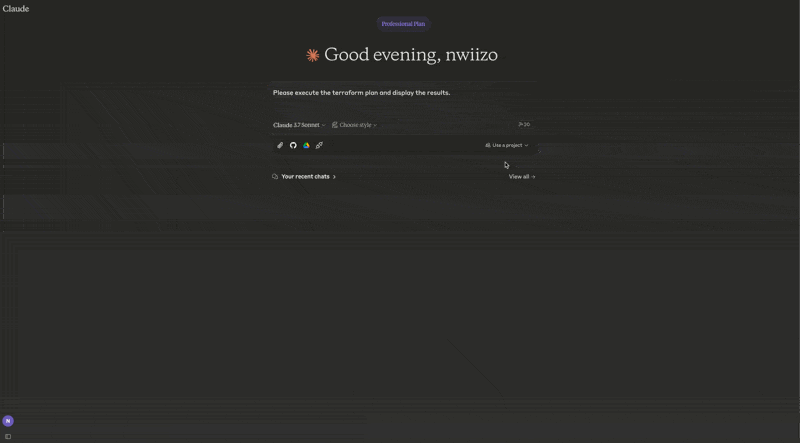Tfmcp: Herramienta del Protocolo de Contexto del Modelo de Terraform
🌍 Herramienta de Protocolo de Contexto de Modelo de Terraform (MCP) - Una herramienta CLI experimental que permite a los asistentes de IA gestionar y operar entornos de Terraform. Soporta la lectura de configuraciones de Terraform, el análisis de planes, la aplicación de configuraciones y la gestión del estado con integración de Claude Desktop. ⚡️
Resumen
¿Qué es tfmcp?
El ### Terraform Model Context Protocol (MCP) Tool, comúnmente conocido como ### tfmcp, es una herramienta experimental de interfaz de línea de comandos (CLI) diseñada para mejorar la gestión y operación de entornos Terraform. Permite a los usuarios leer configuraciones de Terraform, analizar planes, aplicar configuraciones y gestionar el estado, todo mientras se integra sin problemas con asistentes de IA como Claude Desktop.
Características de tfmcp
- Integración de IA: tfmcp admite la integración con asistentes de IA, lo que permite una gestión más inteligente de los entornos Terraform.
- Gestión de Configuraciones: Los usuarios pueden leer y gestionar configuraciones de Terraform directamente a través de la CLI.
- Análisis de Planes: La herramienta proporciona capacidades para analizar planes de Terraform, ayudando a los usuarios a entender las implicaciones de sus cambios antes de aplicarlos.
- Gestión del Estado: tfmcp permite una gestión eficiente del estado de Terraform, asegurando que los usuarios puedan hacer un seguimiento de sus cambios en la infraestructura de manera efectiva.
- Interfaz Amigable: La CLI está diseñada para ser intuitiva, lo que la hace accesible tanto para nuevos usuarios como para usuarios experimentados.
Cómo Usar tfmcp
- Instalación: Comienza instalando tfmcp desde crates.io.
- Configuración: Configura tu entorno Terraform y asegúrate de que tus configuraciones estén listas para el análisis.
- Ejecución de Comandos: Usa los comandos de la CLI para leer configuraciones, analizar planes y aplicar cambios. Por ejemplo:
- Para leer una configuración:
tfmcp read <archivo_de_configuración> - Para analizar un plan:
tfmcp analyze <archivo_de_plan> - Para aplicar una configuración:
tfmcp apply <archivo_de_configuración>
- Para leer una configuración:
- Gestión del Estado: Utiliza tfmcp para gestionar tu estado de Terraform de manera efectiva, asegurando que tu infraestructura permanezca consistente.
Preguntas Frecuentes
¿Cuál es el propósito de tfmcp?
tfmcp está diseñado para facilitar la gestión de entornos Terraform al proporcionar herramientas para la lectura de configuraciones, análisis de planes y gestión del estado, todo mientras se integra con asistentes de IA.
¿Es tfmcp adecuado para principiantes?
Sí, tfmcp es amigable para el usuario y está diseñado para ser accesible para usuarios de todos los niveles de experiencia, incluidos aquellos nuevos en Terraform.
¿Se puede integrar tfmcp con otras herramientas?
Sí, tfmcp está construido para trabajar junto a asistentes de IA y puede integrarse en varios flujos de trabajo para mejorar la gestión de Terraform.
¿Dónde puedo encontrar más información sobre tfmcp?
Para más detalles, puedes visitar el repositorio de tfmcp en GitHub o consultar su documentación.
Detalle
Configuración del Servidor
{
"mcpServers": {
"tfmcp": {
"command": "docker",
"args": [
"run",
"-i",
"--rm",
"ghcr.io/metorial/mcp-container--nwiizo--tfmcp--tfmcp",
"./bin/tfmcp --dir terraform-dir --path path"
],
"env": {
"TERRAFORM_DIR": "terraform-dir",
"TFMCP_LOG_LEVEL": "tfmcp-log-level",
"TFMCP_DEMO_MODE": "tfmcp-demo-mode"
}
}
}
}